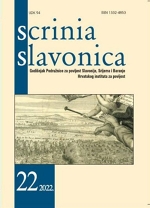UTIŠENJE OŽALOŠĆENIH U SEDAM POKORNI PISAMA KRALJA DAVIDA GRGURA PEŠTALIĆA: HISTORIJSKOANTROPOLOŠKA ANALIZA
Solace for the Bereaved in the Seven Humble Songs of King David by Grgur Peštalić: A Historical-Anthropological Analysis
Author(s): Nikola OstojčićSubject(s): Political history, Social history, Social Theory, Health and medicine and law, 18th Century
Published by: Hrvatski institut za povijest
Keywords: plague; Syrmia; 18th century; anti-epidemic measures; Franciscans;
Summary/Abstract: The poetic work of Grgur Peštalić, the Franciscan friar who witnessed the plague epidemic in Syrmia in 1795, is a valuable source in historiography for various reasons. The main aspect and perspective he offered by exploring a specific case of the plague in this work is dominantly historical-imagological. Particularly discussed in this work are the similarities and dissimilarities of the anti-epidemic measures Peštalić put forward in his work and those suggested by the state. In terms of similarities and dissimilarities it has been assessed whether there was a cooperation between church and state for anti-epidemic purposes; in addition to this, the work is a source that testifies to everyday life during the plague and to the social-political context. Precisely this context and the specificity of the area where the epidemic broke out have been an important factor in the research into the topic of this work. The role of Peštalić as a Franciscan has been examined as well as his activities as a member of the clergy and as a mediator between the local community and the government that was distant from the peripheral area affected by the plague.
Journal: Scrinia Slavonica
- Issue Year: 2022
- Issue No: 22
- Page Range: 127-141
- Page Count: 15
- Language: Croatian

